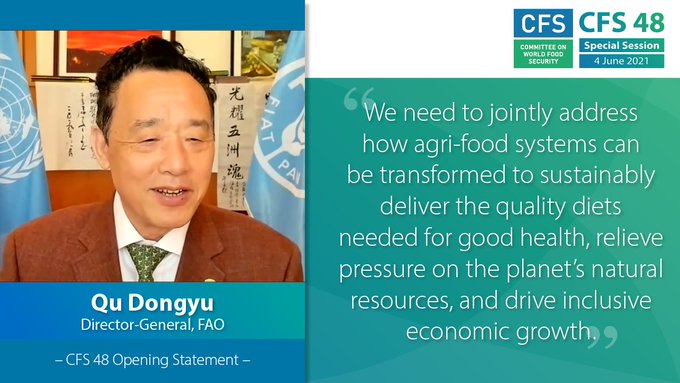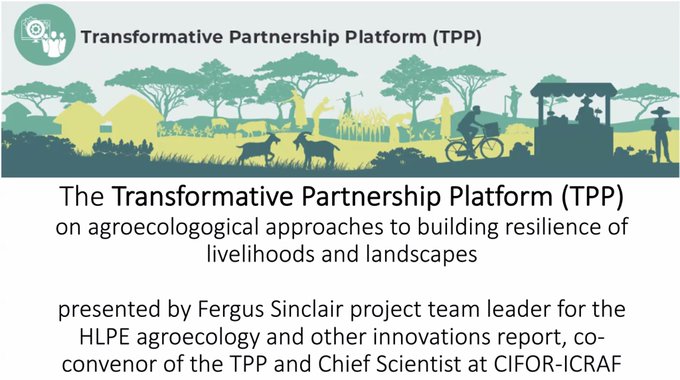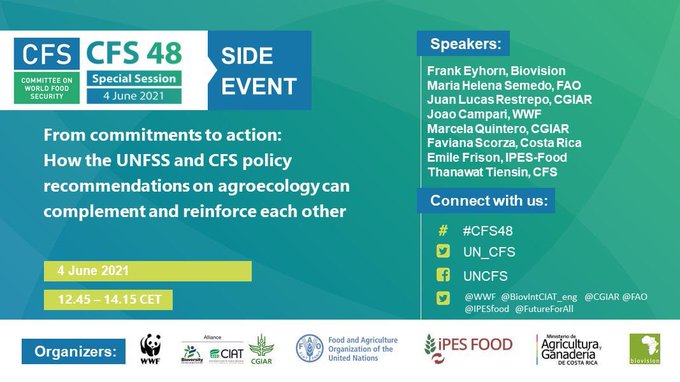Policy Recommendations on Agroecological and Other Innovative Approaches
The Committee on World Food Security (CFS) today endorsed the Policy Recommendations on Agroecological and Other Innovative Approaches for sustainable agriculture and food systems that enhance food security and nutrition at its Special 48th Session.
The Policy Recommendations, approved by consensus of the CFS membership, will provide guidance to countries and stakeholders in strengthening agroecological and other innovative approaches for sustainable agriculture and food systems that enhance food security and nutrition, and the progressive realization of the right to adequate food in the context of national food security. The recommendations underline the importance to improve the sustainability of agriculture and food systems, and the need to reduce their pressure on natural resources and their negative environmental impact, including in relation to climate change, biodiversity, water, and land.
The recommendations result from the progressive realization that a major transformation of food systems is needed to achieve the 2030 sustainable development goal, in particular SDG 2 on zero hunger. While progress has been made with regard to food security, nutrition, poverty reduction and agricultural productivity over the last two decades, this progress has been uneven. Current food systems are unsustainable with evidence by the latest FAO state of Food Security and Nutrition in the World (SOFI) report indicating that nearly 690 million people are chronically undernourished. As many as 130 million more people have been pushed into chronic hunger because of the COVID-19 pandemic.
This session discussed practical lessons in how governments can adopt open and transparent systems in land governance for the benefit of land stakeholders, which increases food security and nutrition. It involved leading women voices on how better governance of land acquisitions can enable government operationalization of the VGGT for the benefit of stakeholders, including indigenous peoples.
The Policy Recommendations, approved by consensus of the CFS membership, will provide guidance to countries and stakeholders in strengthening agroecological and other innovative approaches for sustainable agriculture and food systems that enhance food security and nutrition, and the progressive realization of the right to adequate food in the context of national food security. The recommendations underline the importance to improve the sustainability of agriculture and food systems, and the need to reduce their pressure on natural resources and their negative environmental impact, including in relation to climate change, biodiversity, water, and land.
The recommendations result from the progressive realization that a major transformation of food systems is needed to achieve the 2030 sustainable development goal, in particular SDG 2 on zero hunger. While progress has been made with regard to food security, nutrition, poverty reduction and agricultural productivity over the last two decades, this progress has been uneven. Current food systems are unsustainable with evidence by the latest FAO state of Food Security and Nutrition in the World (SOFI) report indicating that nearly 690 million people are chronically undernourished. As many as 130 million more people have been pushed into chronic hunger because of the COVID-19 pandemic.
Background documents:
- CFS 2021/48/3/Rev.1 - CFS Policy recommendations on Agroecological and Other InnovativeApproaches for sustainable agriculture and food systems that enhance food security andnutrition – Draft Decisions May 2021 2 pp
- CFS 2021/48/2 – CFS Policy recommendations on Agroecological and Other InnovativeApproaches for sustainable agriculture and food systems that enhance food security andnutrition 25 May 2021 13 pp.
- NEW: CFS Policy Recommendations on Agroecological and Other Innovative Approaches
Policy Recommendations:
- Lay or strengthen, as appropriate, the policy foundations for agroecological and other innovative approaches to contribute to sustainable agriculture and food systems that enhance food security and nutrition;
- Establish, improve and apply comprehensive performance measurement and monitoring frameworks to encourage the adoption of agroecological and other innovative approaches for sustainable agriculture and food systems that enhance food security and nutrition;
- Foster the transition to resilient and diversified sustainable agriculture and food systems through agroecological and other innovative approaches;
- Strengthen research, innovation, training, and education and foster knowledge co-creation, knowledge sharing and co-learning, on agroecological and other innovative approaches; and
- Strengthen institutions for stakeholder engagement, create an enabling environment for empowering people most at risk of food insecurity and malnutrition and people in vulnerable situations and address power inequalities in agriculture and food systems.
Recordings:
The Special Session of the 48th Plenary of CFS took place virtually on Friday, 4 June 2021. The endorsement of the Policy Recommendations was moved from CFS 47 (held in February 2021) as their negotiations and completion was delayed due to COVID-19.Side events (extracts):
CFS 48 featured ten side events organized by its partners. Eight of these side events were held on Thursday 3 June 2021 (4 in the morning and 4 in the afternoon) with the other 2 held Friday 4 June 2021.
Side Event 1: Operationalization of the VGGT through Innovative Mechanisms in Open and Transparent Land Governance
This session, organized by the United Kingdom, FAO and CGIAR, identified opportunities and actions needed to scale up agricultural innovation in the lead up to UNFCCC COP26, including through the COP26 Nature Campaign, UN Food Systems Summit and COP15 of the Convention on Biological Diversity.
This session raised awareness about ongoing initiatives to align private sector practices and reporting with the SDGs.This session showcased initiatives based on agroecological techniques, sustainable production of peasant family farming, and women and youth enterprises.Side Event 10: From commitments to action: How UNFSS and CFS policy
This session, organised by SUN (Scaling up nutrition) - SUN Business Network, SUN Civil Society Network and supported by the European Commission (DG INTPA) and Canada, recognised Young people as an important stakeholder at all levels in decision making and action on food systems, to produce healthy, nutritious food in a sustainable way for both people and the planet.
This session was organised by the CFS High Level Panel of Experts (HLPE) on food security and nutrition, to update the HLPE Issues Paper.
Side Event 10: From commitments to action: How UNFSS and CFS policy
recommendations on agroecology can complement and reinforce each other
This session, organised by WWF, Alliance of Bioversity International and International Center for Tropical Agriculture (CGIAR), FAO, the International Panel of Experts on Sustainable Food Systems (IPES-Food), Biovision, demonstrated the interlinkages and potential synergies between the CFS policy recommendations and UNFSS to scale up agroecology.




No comments:
Post a Comment